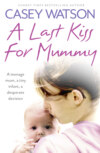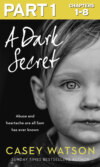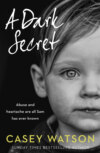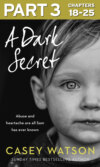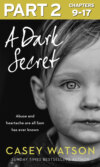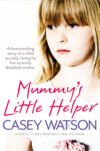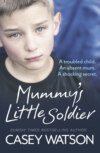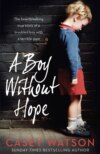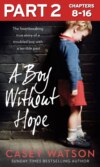Loe raamatut: «A Last Kiss for Mummy: A teenage mum, a tiny infant, a desperate decision»

Contents
Cover
Title Page
Dedication
Acknowledgements
Chapter 1
Chapter 2
Chapter 3
Chapter 4
Chapter 5
Chapter 6
Chapter 7
Chapter 8
Chapter 9
Chapter 10
Chapter 11
Chapter 12
Chapter 13
Chapter 14
Chapter 15
Chapter 16
Chapter 17
Chapter 18
Chapter 19
Chapter 20
Epilogue
Exclusive sample chapter
Casey Watson
Copyright
About the Publisher
Acknowledgements
I would like to thank all of the team at HarperCollins, the lovely Andrew Lownie, and my friend and mentor, Lynne.
Chapter 1
I’ve known my fostering link worker, John Fulshaw, for something approaching seven years now, so I’ve got to know his face pretty well. I’ve seen his happy face, his sad face, his ‘I don’t know how to tell you what I’m about to tell you’ face, his concerned face, his angry face and his ‘Don’t worry, I’ve got your back’ face as well.
So there wasn’t much that got past me, and today was no exception. There’d been this glint in his eye since the start of our meeting; a glint that told me that today he was wearing his ‘I can’t wait to tell you’ face. He’d had ants in his pants since he’d arrived.
It was a chilly autumn morning at the end of October. Not quite cold enough to put the heating on mid-morning, but certainly cold enough for me to be wearing my standard winter months outfit of leggings, a fluffy jumper and boots. My husband Mike had taken a rare day off from his job as a warehouse manager, and we were all grouped around the dining table, drinking coffee and trying to avoid eating too many biscuits, because it was the day we had our annual review.
It’s something all foster carers have, as a part of what we do – a summing up of how things have gone during the previous year. It’s a time to look back to previous placements, discuss what went well and what didn’t, talk about any complaints and allegations (none for us, thankfully) and, if appropriate, talk about what new things might happen in the coming year. It’s also an opportunity to discuss further training. As specialist foster carers we usually attend at least three training courses per year. In our case, today, everything had been positive, thank goodness. Not every placement works out well – that’s the nature of the job – but we had had a good year and Dawn Foster, the reviewing officer, who was also present, had praised me and Mike for the way we’d handled our last placement: two unrelated nine-year-old boys. Both had certainly been in need of support. Jenson was somewhat wayward, being the child of a neglectful single mother – one who’d left him and his sister home alone while going off on holiday with her boyfriend for a week. Georgie’s problems were different. He was autistic and had come from a children’s home that was closing down; the place where he’d spent almost all of his young life. Individually, both boys came with their own challenges, but our biggest challenge was that we’d had them both together. It had been a rocky ride at times, but, thankfully, they ended up friends.
The review over, and with Dawn on her way back to the office, I closed the front door with a now familiar tingle. We were between placements at the moment and the warm glow I’d felt when Dawn had been singing our praises had now been replaced with a feeling I knew all too well; one of excited anticipation. Just why did John have those ants in his pants? At last I’d have a chance to find out.
When I went back into the dining room – well, dining area, actually; the downstairs of our house is open plan – John was grinning and rubbing his hands together.
‘Well?’ I asked. Mike looked at me quizzically, but John laughed.
‘Get the kettle back on then,’ he said, his eyes glinting mischievously, ‘and I’ll tell you what I’ve been dying to tell you for the last hour.’
By the time I got back, of course, the pair of them were both grinning like idiots, so it was clear Mike was now one step ahead of me. I set the tray down and took my place back at the dining table. ‘Come on then,’ I said, plonking both elbows down. ‘Spit it out.’
Mike laughed, seeing my expression. ‘I think you’d better, John.’
John took his time, picking up his mug and taking a first sip of fresh coffee. ‘Actually, it’s not so much a “tell” as something I want to run by you.’
Which was always ominous. John had a history of wanting to ‘run things by’ us. It invariably meant he wasn’t confident that it was something we’d say yes to – at least wouldn’t say yes to if we had any sense. But that never fazed us. We had never been trained to do mainstream fostering. We were specialists – we specialised in taking the sort of kids that were too damaged or disturbed, for whatever reason, to be suitable for mainstream fostering or adoption.
So what would it be today? I raised my eyebrows enquiringly. ‘So, Casey,’ John said, speaking mostly to me now. It was me, after all, who’d do the day-to-day childcare. We fostered together but Mike obviously had his full-time job as well.
‘Yes,’ I said eagerly.
‘Well, it’s this,’ he said. ‘Have you ever considered a mother and baby placement?’
I caught my breath. No, I hadn’t. It had never even occurred to me. A baby was hardly likely to be damaged at such a tender age, after all. On the other hand, what about the mother? My mind leapt ahead. A baby! I adored babies. Always had. Everyone knew just how besotted I was with my own two grandsons, Levi and Jackson. ‘What do you mean, exactly?’ I thought to ask then. ‘A mother and a baby, or a young pregnant girl?’
John grinned. He could read my expressions just as easily as I could read his. And mine currently had the word ‘baby’ flashing up in neon on my forehead. He knew how fond I was of saying how much I could almost eat my little grandsons, so it was odds on my interest would be piqued.
‘Good point,’ he said. ‘You’ve obviously read the handbook very thoroughly, because you’re right; a mother and baby placement can be either. But in this case, an actual baby. The mum, Emma, is just fourteen and baby Roman is three weeks old.’
‘Oh!’ I cooed. ‘Roman! What a lovely name she’s chosen!’ I turned to Mike. ‘Oh, please, we must. Oh, imagine having a new baby in the house. It would be great.’
‘Slow down, love,’ Mike warned, as I’d already known he would. That was the way it worked with us – I was all enthused and optimistic, whereas Mike was more reticent, always considering potential pitfalls. As systems went, it was a good one, because though more often than not I got my way, it at least meant I rushed into things slightly better informed than I would have been if left to my usual impetuous devices.
He turned to John now. ‘Did she have the baby in care?’ he wanted to know. ‘Or is she just coming into the system?’
‘Good question,’ John said. ‘And you’re right to be cautious, Mike. Emma has been in and out of care for most of her life. Her mother swings between periods of calm and what seems to be pretty “difficult” behaviour. It’s a familiar story, sadly. The mum is alcohol and drug dependent most of the time, and suffers from depression too – cause and effect? – though she does go through periods of drying out now and again. She’s a single parent, and Emma is her only child. When she’s clean she always wants to have Emma back living with her again – which is what Emma usually wants, too – but it’s never too long before the depression takes over again, and then the drinking starts and the poor kid is scooted back into the care of social services quick-smart.’
The atmosphere in the room changed. That was all part of the process; going from asking all about a new child who needed us, to the sober contemplation of just how that state of affairs had come about. The baby, for the moment, was forgotten, as my heart went out to his mother – this poor fourteen-year-old girl who I didn’t yet know. I took a moment, even though I knew we would have to take her in. I mustn’t let Mike and John think I was jumping in too quickly and not taking time to assess the situation properly. I tried to hide my growing excitement (and it was excitement, no question) as I turned and spoke to John.
‘So what’s the situation?’ I asked. ‘Any boy in the background who is willing to take responsibility?’
John reached into his briefcase and took out a by now familiar buff-coloured file. Popping on his reading glasses he then flicked through some pages. ‘Yes and no,’ he said. ‘It’s complicated. What happened,’ he glanced up, ‘well, according to the mother, anyway, is that Emma had started running a bit wild and next thing was that she found herself pregnant. She’d been back living at home again for almost a year by this time – a pretty longish stretch, given the history. Anyway, when the mother found out about the pregnancy she insisted Emma have an abortion, but Emma apparently refused. At that point the mother washed her hands of her completely, and threw her out, apparently thinking that in doing so she might make Emma come to her senses.’
Mike frowned. ‘So not out of character at all, then,’ he muttered drily. And I tended to agree with him. Could I ever imagine throwing my teenage pregnant daughter out on the street just to make her ‘come to her senses’? Not in a million years. I couldn’t think of a more perfectly designed recipe for disaster. But then, I wasn’t her, was I? And drink, drugs and depression affected a person in all sorts of dangerous ways.
‘Well, exactly,’ John agreed. ‘And of course, the abortion didn’t happen, and since that time Emma’s been staying with various friends, mostly with another girl – a friend who lives on the same estate, with her single mum. That’s where she is now. But since the baby was born just over three weeks ago, the girl’s mum’s apparently said she can’t afford to keep both Emma and Roman, and that’s the point when Emma’s mum finally got in touch with social services.’
‘To put her straight back into care again,’ I said. It wasn’t a question. Just a sad, all too familiar statement of fact: she obviously didn’t want either daughter or grandchild back at home with her, presumably as the lesson hadn’t been learned. ‘What about the boyfriend, then?’ I went on, thinking what a desperate situation it was for a baby to be born into. ‘There’d be some police involvement, wouldn’t there, given that she’s under age?’
John paused to sip some coffee. ‘As I say, it’s complicated. And here’s the stinger; we and just about everyone else, apparently, believe the father is a nineteen-year-old drug dealer, name of Tarim. Emma had been seeing him for some time, it seems, though she has always denied that he’s the father.’
‘As I suppose she would,’ Mike said, ‘if she didn’t want to get him into trouble.’
John smiled wryly. ‘Which he already is. He’s in prison right now, doing time for dealing. Went down while she was still pregnant. He has previous form, apparently – so has not been on the scene at all. And though Emma’s adamant he’s not the father, the woman she’s been staying with is absolutely convinced he is. The baby is the spit of him, apparently. Though of course they want the relationship discouraged, just as much as Emma’s mother does, saying he’s no good for her –’
I shook my head. ‘Really?’ I said wryly. ‘Whatever makes her think that?’
John nodded and closed the file. ‘Quite, Casey. So that’s where we’re at. And it’s a lot to think about so I do want you both to have a think.’
So no plunging in feet first, as I usually liked to do, then. And John was right to tell us to think because it was a great deal to take on. A newborn baby on its own would be a big physical challenge – babies were exhausting, full stop, for anyone. But to take on a newborn and a teen mum – one barely even into her teens in this case – would add a whole other layer of complication. She’d have her issues – how could she not, given her upbringing and current circumstances? – not to mention the ever-present spectre of having her baby taken away from her if she couldn’t prove she was able to look after it. And what about this mum of hers? What might happen there? Much as I couldn’t personally get my head round the idea of throwing out my own daughter and grandson, I wasn’t naïve either. This was a woman with a long history of substance abuse and mental illness, which meant all bets were off as far as good parenting manuals were concerned. The poor girl. What a mess to bring a new life into. She must be reeling and terrified, the little mite.
I glanced at Mike, who was deep in thought as well. I could tell. I met his eye, wondering if he was thinking what I was – that we had to find a way to make this work.
‘Look,’ said John, ‘don’t rush into this. It’s a huge undertaking and I would absolutely understand if you didn’t feel it was for you. After all, most mother and baby carers go through a specific course of training …’
‘I’ve had two children,’ I chipped in, ‘both fully grown now, not to mention two grandchildren, not to mention eight foster kids and counting … it is eight, isn’t it, Mike?’ I started pretending to count on my fingers.
John smiled at me. ‘I’m serious, Casey. This is a complicated placement. With a great deal of potential for getting even more complicated, as I’m sure you realise all too well. Look, you know why I’m putting this to you. It’s because I think the two of you could handle it. Of course I do. But I still have to talk it through with Emma’s social worker anyway. Plus the baby’s – he’ll obviously be allocated his own social worker, if he hasn’t been already. Which’ll give you two time to discuss it –’ he pushed the buff folder across the table to us. ‘To read up properly, to consider the implications and think it through before committing. A new baby affects everything, as you both know all too well. Means changing plans, not booking holidays, having your whole routine thrown into disarray …’
‘Well,’ said Mike, his positive tone of voice making my heart leap. ‘It certainly does sound like something we should consider. But as you say,’ he said, looking pointedly at me, ‘we do need to weigh it up properly. Can you give us a day or so?’
John nodded as he rose from the table. ‘Absolutely. As I say, I have to talk things through with the social workers anyway. And no doubt you’ll want to have a chat with the rest of the clan, too.’
Which we would. The clan in question mainly being our daughter Riley and her partner David. If we were talking baby stuff, I doubted we’d be able to keep Riley away. She loved babies as much as I did, loved to immerse herself in children generally, and was also keen to help out whenever she could when we were fostering, because she and David had just finished the training to become foster carers themselves. We’d obviously also need to speak to our son Kieron. Though he no longer lived at home – he shared a flat with his long-term girlfriend Lauren – we never did anything that would impact on any member of the family without consulting them first. It wouldn’t have been fair. Because John was right, having a new baby in the mix would change everything. Which would obviously affect everyone else.
But I was champing at the bit. And it must have been obvious because as soon as we’d waved John off Mike held his hand out. ‘Come on,’ he said, ‘hand it over.’
He was talking about the file, which I’d picked up from the dining table as we’d shown John out.
‘What?’ I said, all innocent, seeing the firm set of his jaw line. I obediently gave him the file.
‘You know very well what,’ he answered, taking it. ‘So how about you go and make more coffee while I dive in to this. I want a good read of what’s in here before you dive on in at me. I have a feeling I’m going to need to be very clued up and alert before we have this next conversation.’
I laughed as I trotted off back into the kitchen. That husband of mine knows me so well.
Chapter 2
I yawned and stretched. It was one of those dark autumn mornings when the fact that you didn’t need to get up and go anywhere made the duvet seem almost hypnotic. Just so soft and so cosy … just fifteen minutes more, perhaps. I’d been having a particularly nice dream, after all. A bit bonkers, admittedly, but that was par for the course with me. My head was always so full of different people and their problems in the daytime, and then they all got scrambled up when my head hit the pillow and came back in different guises in my slumbers. This one was obviously related to the news John had brought to us, as it was chock full of babies: happy, smiley, sweet-smelling babies, which … Yikes! The fifteen minutes had obviously turned into a whole hour. And then some. When I next checked the bedside clock it was nine forty-five!
There are days when it’s okay to oversleep, and days when it isn’t, and today was very much the latter, being the day we were going to have our second meeting about taking on Emma and her baby. I threw the covers off, knowing I’d better get my skates on and shower. Today was important, so both house and I had to look our best. I smiled to myself as I turned on the water; it was ironic that almost my last thought before falling asleep the previous evening was that I’d better make the most of any lie-ins I had left to me. With a three-week-old baby in the house they’d soon be in very short supply.
But I was getting ahead of myself. We hadn’t actually agreed to that yet. Mike and I had discussed Emma at length on the Monday evening, after which he’d agreed I could call John and say yes only to taking the next step. ‘No promises, though, Casey,’ he’d warned, and I knew he’d meant it. ‘We need to know exactly what’s expected of us and we have to feel happy. Me in particular –’ He’d fixed his eyes on me, to press the point home. ‘I haven’t forgotten the Sophia experience, not one bit.’
‘Oh, don’t be dramatic,’ I rushed to answer, keen to keep him positive. ‘We’ve had other foster kids since Sophia and they’ve been challenging as well, love …’
‘Not teenage girls, Casey,’ he shot back at me. ‘With all their teenage girl behaviours. You might have forgotten all about that, but I certainly haven’t.’
He was right to point it out, because of course I wanted to hurry past that. Sophia had been a teenage girl we’d fostered a few years back, and she had certainly been an eye opener. It had been only our second placement and I suppose we were still a bit inexperienced; certainly in regard to children as psychologically complex as she had been. She had been full-on, promiscuous, full of the usual teenage angst and lots more besides, and had come to us with only one mode of operation: flirt with the male of the species at all times. Not that it was her fault; she had become the way she had due to her terrible circumstances, and had learned flirting with men at her mother’s knee, practically – as a good method of getting her way.
Until she came to us, that is, and in Mike found an immovable object that would remain so however hard she tried to be an unstoppable force. We came through it, thank goodness, and so were able to help her all the better for having been through so much with her. But when you’re a middle-aged foster dad and have a fourteen-year-old foster daughter running around in her underwear, determined to create an impact, it’s not a very nice place to be. It was equally distressing – if not more so – for our son Kieron, then just coming up to twenty-two, because she created some uncomfortable waves between him and his then brand-new girlfriend, Lauren.
We’d all learned to love Sophia, once we’d got past all that, but Mike had every right to make me sit down and think about things before plunging in with both feet again without thinking, like I usually did.
And I did think – we’d also run it by the children the previous evening, because their input was as important as our own. Riley, predictably, was as excited as I was. ‘Oh, Mum, a baby? Oh, that will be such a lovely change for you.’
I grinned. ‘Um, yes, it will,’ I agreed, ‘but not just a baby. This one does come with a teenaged mum attached, don’t forget.’
‘Yes, I know that, Mum,’ she said. ‘But you’ll be fine. Teenagers to you are like toddlers are to me – easy peasy.’
I raised my eyebrows. Oh, really? I thought. She must have a short memory. Or just that selective amnesia that parents need to have, if every child in the world isn’t to be an ‘only’. Bless them, I loved them, but my grandsons had not been ‘easy peasy’ at all; they had been as demanding as any other little boys I ever knew, made worse by the fact that they were so close in age.
Still, I was flattered that Riley assumed teenagers were ‘easy peasy’ for me to handle, even if that wasn’t strictly the case either. I did have some considerable experience of them to draw on, it had to be said, having spent many years handling them in large numbers in a behavioural unit in a high school, but dealing with kids in a school setting and having them in your home were two completely different things, as our experience of fostering so far had shown us.
But I was pleased Riley was happy for me, and felt so positive about it. It was generally Riley who sided with Mike in all situations where jumping in with both feet was my normal way of carrying on.
Kieron and Lauren had reacted in a similar fashion. They’d probably not be that involved in any case because they were both busy with their own lives. Right now, specifically, they revolved around working as many hours as they could manage, to save up for getting their own place.
‘It’s up to you and Dad,’ Kieron had said, laughing, when I asked him how he felt about it. ‘I don’t even know why you feel you have to ask us, because you’ll only do what you want to do anyway!’
I jumped out of the shower, towelled myself dry and began to ferret in my wardrobe for something suitable to wear. Kieron was right, I supposed, though I’d keep asking him anyway. Because one day he might have strong opinions about a placement, and I knew that however headstrong I was I would respect that. In the short term, however, I had to get a move-on. Mike was taking time off from work to attend this afternoon’s meeting, so would be home before I knew it, for an early lunch.
And then we’d be up and running – and there was no mistaking the little shiver of excitement I felt about it. And also intrigue. The start of a new placement didn’t just mean getting to know a new child – in this case, children – but also the start of a new relationship with the child’s social worker, too, and I wondered what this one might be like. It might be someone I’d worked with already, of course; I’d certainly had dealings with plenty over the years. But in reality that had never actually happened. Every new child seemed to come with a new social worker, too, so it was no surprise that I didn’t recognise the name of this one.
Her name was Maggie Cunliffe, and I wondered what she was like. With the name Maggie, I pictured her to be in her mid-forties to fifties, which pleased me for some reason. I tutted to myself – how very ageist of me!
The truth was, of course, that good social workers, like the kids in their charge, came in all sorts of shapes and sizes. I’d met young, fresh-faced types, just out of university and keen as mustard, right through to the battle-worn, tattered-suited, ready-for-retirement types. Where would Maggie fit in here, I wondered? Well, we would soon see.
Very soon, as it turned out, the already short morning having disappeared from beneath me, with Mike dashing in with less than fifteen minutes to spare. And my response to his greeting of ‘Get the kettle on, love, will you? While I run up and shower’ was greeted, in return, by my usual pre-meeting answer of ‘Don’t you dare leave so much as a drip on my bathroom floor!’
I was always a bit like this when an important meeting loomed. I’d done the house from top to bottom yesterday but I still felt I could do more. I’m a bit of a clean-freak and was characteristically anxious in case I’d missed some speck of dust or splash of water somewhere. Ridiculous, really, since neither John nor Maggie would be up inspecting my bathroom, but even so I just couldn’t help it.
‘Now, remember,’ Mike warned me, having come back down and joined me at the dining table, ‘we’re here to listen to what they have to say; to mull it all over and consider the possibilities. Not to immediately ask when the girl can move in, okay?’
‘Oh, be quiet, Mike,’ I chided him. ‘I’m not a child, you know. Anyway, they’re here now,’ I added, gesturing to the car that was pulling up outside. ‘Go on,’ I said. ‘Go let them in.’
I smoothed my blouse down over my jeans and glanced again out of the window as Mike did so, childishly pleased to see that I’d been right; Maggie Cunliffe looked exactly like a Maggie. Mid-forties or thereabouts, I decided, with a lovely warm expression and curly blonde hair. She was also, I noticed appreciatively, dressed in jeans and a warm jumper. Nothing prim or proper about her. I felt immediately at ease.
The file itself, however, looked rather more daunting. Introductions done, the coffee poured, the biscuits politely declined – so far – it appeared out of Maggie’s briefcase and landed on the table with a dull thud. Which was unusual. It was normally the case that we had almost nothing to go on, and had to find out the extent of a child’s difficulties the hard way.
Not so here, clearly. Maggie dived straight in with a summary.
‘Emma’s mum was only sixteen when she had Emma,’ she began. She had a soft Scottish accent, which seemed to go just perfectly with her name. ‘There was no boyfriend – again, there’s no knowledge of who the father was – and, as you already know, Shelley – that’s her name – has battled with her demons since we’ve known her. She’s an only child herself and has long since been estranged from her own mother, and has a long history of substance abuse. Various addictions have been on file here: alcohol, prescription medicines, as well as an array of illegal drugs. During her worst periods – and there have been quite a few down the years – she’s had Emma placed into care, or had the authorities just step in and take her, but, because she never objected and so often put Emma in care voluntarily, a court order’s never been sought.
‘Every now and then,’ Maggie continued, ‘Shelley would sign herself up for rehab, get clean, and then come out determined to step up to the plate and take proper care of her daughter, but of course the harsh reality is that with each new episode of this kind she was just chipping away at Emma’s trust.’ Maggie sighed. ‘So, as night follows day, each time Emma went back into care – and the older she got – the more and more she felt she didn’t need her mum. It’s a really sad one, this.’ She glanced up and looked directly at me. ‘You can see how the picture’s formed here, can’t you, Casey? And it’s why we’ve ended up with the Emma we have today.’
I nodded sadly. I could see it all too clearly. She’d be feeling lost, hurting lots and desperately needing some attachment. In my years working with teenagers I’d seen so many like her; girls who’d gone on to get pregnant at such a tragically early age simply to stop an ache that they had inside them. It was partly a need to nurture, a need to have at least something – someone – to call their own, to replace the pain of not having a mother’s love and affection.
‘I can indeed,’ I agreed, visualising this poor child so very well. ‘And we’re up to speed with the situation with the boyfriend, as well. John’s filled us in there.’
‘Yes, indeed,’ John confirmed. ‘So the next stage, if you wouldn’t mind, Maggie, is to fill Casey and Mike in – well, fill all of us in, actually – about anything extra that has to happen, given this is a mother and baby placement. I’m not fully conversant; is there some extra training that might need to be involved?’
Maggie shook her head. ‘Not in this case, I don’t think. If you were new to fostering, obviously, or if you’d not brought up your own kids, but, no, in this case, I wouldn’t insult your intelligence. It’s obviously not going to be like your usual programme – no points system for Emma to follow or anything – just gentle guidance; it’s more a case of both providing a loving, supportive, non-judgemental home for the two of them, and helping Emma take responsibility for taking care of her child herself.’
I nodded. There was a world of difference between that and being looked after. Emma was Roman’s mother and had to be a mother to him. It would be all too easy for her to slip into a completely different, more dependent role, were she allowed to. I’d seen it happen myself. And it was understandable to some extent, as any mother would probably know; even if your child becomes a mother they are still very much your child, so if they were thirteen or fourteen – even fifteen and sixteen – the urge to mother both child and grandchild would be strong. I would have to guard against doing that, for definite, because it was the sort of thing that would feel so natural to do.
Tasuta katkend on lõppenud.
